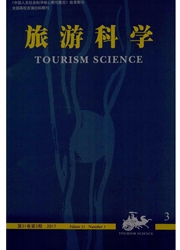

 中文摘要:
中文摘要:
本文在系统梳理旅游目的地竞争力研究主要成果的基础上,通过搭建省域旅游竞争力评价指标体系,运用多指标综合评价的主成分分析法,以省域为研究单元,对我国31个省市自治区的旅游竞争力水平进行定量评价。结果显示:规模实效因子、企业活力因子、经营绩效因子和消费支撑因子是影响我国省域旅游竞争力总体水平的主要因子,4项指标对我国省域旅游竞争力的累积贡献值已经超过80%;从空间结构上看,我国各省市自治区之间旅游竞争力总体水平之间存在较大差距,东中西部地区各省份的旅游竞争力之间存在显著的梯度递减格局,东部地区省份的旅游竞争力水平领先于中西部地区,但一些省份也表现出一定的变异特征。从旅游的综合性和系统性角度出发,研究认为区域旅游竞争力的提高是一项系统工程,区域旅游产业的效益更多地来自于全方位和全要素的产业发展,而这些要素既涵盖旅游系统内部的各项要素,又与区域社会经济发展的整体水平密切相关,因此,增强区域旅游竞争力必须强调各项要素的均衡、协调发展。
 英文摘要:
英文摘要:
Based on sorting out the present achievement of research on tourist destinations' competitiveness, this paper builds a provincial tourism competitiveness index system, carries on quantitative analysis of 31 provinces and autonomous regions' tourism competitiveness of China by applying principal component analysis method with province as unit. The result shows that: the scale performance factor, the corporation vitality factor, the economic performance factor, and the consumption support factor are the four main factors affecting the overall level of China' s provincial tourism competitiveness, that contribute more than 80% to the cumulative value; From spatial pattern aspect, the overall levels of competitiveness are different among the provinces and autonomous regions. There exists a significant gradient descending pattern among the eastern, central and western regions, and the eastern regions are at a higher level than central and western regions with some provinces showing some variability; From the comprehensive and systematic perspectives of tourism, the improvement of the competitiveness of regional tourism is a systematic project. The benefits of regional tourism industry are more from all aspects and all elements of the industry, which covers all elements within the system and closely relates to the overall level of the regional socio-economic development. Therefore, it should be ensured that all the elements should develop in a balanced and coordinated way in order to enhance the regional tourism competitiveness.
 同期刊论文项目
同期刊论文项目
 同项目期刊论文
同项目期刊论文
 期刊信息
期刊信息
